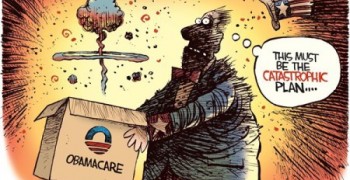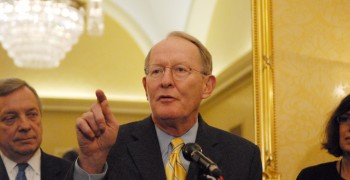Obamacare is actually not so affordable -- unless you're broke
It's time for the Affordable Care Act to join a long list of oxymorons.
The Street
Simon Constable
Why? Because rather like "military intelligence," "cat proof," "government organization," and "simple calculus," the law better known as Obamacare turns out to be an inherent contradiction. For a sizeable part of the population, anyway.
The ACA is just not affordable to a big chunk of those it was most meant to serve: The previously uninsured. In fact, many are worse off than before, according to a new study. That fact could also unravel part of the program's foundation, which could be a problem for healthcare insurers.
"Many of the non-poor formerly uninsured are estimated to be worse off," than without insurance, according to a September-dated working paper from the National Bureau of Economic Research titled "The Price of Responsibility: The Impact Of Health Reform On Non-Poor Uninsured."
How so? The subsidies are not large enough to offset the cost of the insurance premiums and the fact that many previously uninsured will now have to pay part of the cost to see a doctor, the report explains. The authors reached that conclusion after reviewing data for the uninsured prior to Obamacare, including age, gender, earnings and location. Then, they married that information with health-care expenditures for the group and used it to make estimates of out-of-pocket costs before and after the law went into effect.
The group of people whom the authors highlight are the non-poor, or those ineligible for Medicaid but who maybe eligible for various subsidies for premiums or cost-sharing, depending on their income level. It turns out that the more someone earns the worse off they'll be.
"At higher income levels, small or zero subsidies and currently modest penalties will not be enough to affect the large welfare losses that the middle class uninsured experience were they to buy coverage," the report says. Those in good health were "consistently worse off from purchasing coverage regardless of the assumptions made," according to estimates calculated by the researchers.
Is this the fault of healthcare insurers like Aetna, United Healthcare, Cigna, or Anthem ? Not really. It's just the way the law is designed. Will it mess up their actuarial calculations? Probably so, because an important demographic of healthy people may simply not buy coverage.
"Most uninsured will lose and, according to our estimates, will prefer to remain uninsured at the current penalty levels for violating the individual mandate," the report continues.
Ultimately, people will do what is in their own best interests. In this case, many individuals who realize that signing up for healthcare insurance is a losing proposition financially simply won't do it.
In this case, it will be those with higher incomes and better health -- the population insurance companies need in order for their actuarial assumptions to work.
What happens if the healthy don't sign up? Either the insurance companies stand to take a loss because overall claims are larger than the revenue from premiums and subsidies, or they raise premiums, making it even more unlikely that the healthy will sign on.
The big question now: Who will bear the financial brunt of this problem, the people buying or the insurance companies or both?

